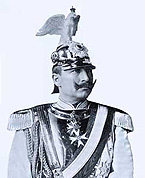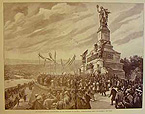Schrift: größer/kleiner
Inhaltsverzeichnis
Sie sind hier: WirRheinländer > english version > Jingoism > Kaiser Wilhelm II and the Rhineland
Jingoism
Kaiser Wilhelm II and the Rhineland

It was not until after the accession to the throne of Wilhelm II (1859-1941) in 1888 and the resignation of Bismarck in 1890 that tensions in the relationship between Rhinelanders and old Prussians began to relax. Although he embodied the Rhenish caricature of Prussian grandeur in his public appearances, the Kaiser gained a great deal of support at the Rhine. He, the Protestant Berliner, admired the power and magnificent displays of the Catholic Church and the patriotism of the Rhinelanders.
Throughout the entire 19th century the Rhine played a prominent part in German national consciousness. After patriotic Rhenish songs had appeared during the liberation wars against Napoleon, in September 1840 the jurist Nikolaus Becker (1809-1845), born in Bonn, wrote a frequently read poem with the title "The German Rhine".
By doing so, he was responding to recent claims by France to the left bank of the Rhine. The first verse of his poem reads: "They shall not have him, / The free German Rhine, / Even though, like greedy ravens / they shriek themselves hoarse for him." Becker’s verses inspired other authors to emulate him. For instance, Ernst Moritz Arndt (1769-1860), recently returned to his professor’s chair in Bonn, took the opportunity, at the laying of the foundation stone for the Hermann Monument near Detmold in 1841, to add two verses to his song "What is the Germans’ Fatherland?", written in 1813. From then on, the song ended with the words: "It shall be the whole of Germany! / Let it be heard from the Belt to across the Rhine. / The ancient Romans sank, the little Romans [French or Catholic] are sinking, / Where steel glints in German fists. / That’s the way it’s meant to be! / So was my Germany, and so it shall be again!"

However, not all supporters of the German Rhine lyrics shared this pathos. The literary historian Robert Eduard Prutz (1816-1872) was one who saw the freedom of the Rhine conjured up by Becker repressed in the Vormärz (from 1815 to the 1848 revolution). In his poem "The Rhine" he admonished the "Princes and Vassals":
"With you the battle must begin! / Should you be led by hoarse shouting / And stream into the waves of the Rhine, / Then you will be German and free!" Similarly, Georg Herwegh (1817-1875) , one of the ringleaders of the 1849 uprising in Baden, lamented in "The Protest" (1841), that “no free men” lived on the banks of the Rhine.
Max Schneckenburger (1819-1849), like Arndt, Prutz and Herwegh not a Rhinelander, with his poem "The Watch on the Rhine" ("It roars out like a clap of thunder, / like the clashing of swords and the crashing of waves. ...") of November 1840, wrote a piece of German Rhine lyrics, set to music in 1854 by Karl Wilhelm (1815-1873), which kindled the flames of great national enthusiasm at the time of the Franco-German War of 1870/71. This song became so popular that the political left wing also used it. During the time of the "Law against Socialists" (1878-1890) several parodies of "The Watch on the Rhine" appeared, which was officially banned, but difficult for the authorities to enforce, as the melody was not forbidden. The "Proletarians’-Songbook" of the radical social democrat Johann Most (1846-1906) from the late 1860’s contained two versions of "The Watch on the Rhine".
While one version ("It doesn’t sound like a thunderclap, / Nor clashing swords, nor crashing waves ...") keeps to the original text of Wilhelm’s composition for the first couple of lines and then clearly departs from it, the other retains substantial elements of the poem ("The Watch on the Rhine, that is the title/ Of the song that’s all the rage ..."), but based its musical accompaniment on a drinking song. The melody was also sung as a fighting song with a new text ("The shout goes up as fast as the plague / The shop-steward [strikers’ negotiator] is sitting in gaol ...") during the Ruhr miners’ strike in 1889.


